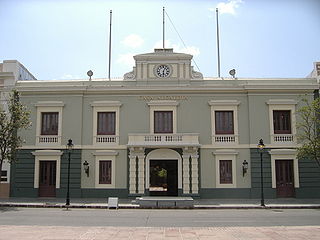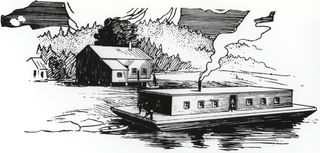Related Research Articles

A municipality is usually a single administrative division having corporate status and powers of self-government or jurisdiction as granted by national and regional laws to which it is subordinate.
Section 33 of the Canadian Charter of Rights and Freedoms is part of the Constitution of Canada. It is commonly known as the notwithstanding clause, sometimes referred to as the override power, and it allows Parliament or provincial legislatures to temporarily override sections 2 and 7–15 of the Charter.
An ex post facto law is a law that retroactively changes the legal consequences of actions that were committed, or relationships that existed, before the enactment of the law. In criminal law, it may criminalize actions that were legal when committed; it may aggravate a crime by bringing it into a more severe category than it was in when it was committed; it may change the punishment prescribed for a crime, as by adding new penalties or extending sentences; it may extend the statute of limitations; or it may alter the rules of evidence in order to make conviction for a crime likelier than it would have been when the deed was committed.
The Constitution Act, 1982 is a part of the Constitution of Canada. The Act was introduced as part of Canada's process of patriating the constitution, introducing several amendments to the British North America Act, 1867, including re-naming it the Constitution Act, 1867. In addition to patriating the Constitution, the Constitution Act, 1982 enacted the Canadian Charter of Rights and Freedoms; guaranteed rights of the Aboriginal peoples of Canada; provided for future constitutional conferences; and set out the procedures for amending the Constitution in the future.
The Ontario Municipal Board (OMB) was an independent administrative board, operated as an adjudicative tribunal, in the province of Ontario, Canada. It heard applications and appeals on municipal and planning disputes, as well as other matters specified in provincial legislation. The tribunal reported to the Ministry of the Attorney General from 2012 until it was replaced in 2018. The Board had been criticized for its broad powers and authority to override the Planning Act decisions of municipal councils.
A municipal council is the legislative body of a municipality or local government area. Depending on the location and classification of the municipality it may be known as a city council, town council, town board, community council, rural council, village council, or board of aldermen.

Parliament of Sierra Leone is the legislative branch of the government of Sierra Leone. It is principally responsible for making laws. The Sierra Leone parliament consists of 149 members, of which 135 members are directly elected from across Sierra Leone's 16 districts, while 14 are paramount chiefs appointed from the 14 rural districts. The parliament is led by the Speaker of the House; the position is currently held by Abass Bundu of the Sierra Leone People's Party. The current elected 135 ordinary members of parliament are composed of members of the All People's Congress and the Sierra Leone People's Party which are the two largest political parties in Sierra Leone.

Quebec law is unique in Canada because Quebec is the only province in Canada to have a juridical legal system under which civil matters are regulated by French-heritage civil law. Public law, criminal law and federal law operate according to Canadian common law.

The Barbuda Council, officially the Council of Barbuda, is a local authority that manages the internal affairs on the island of Barbuda. The council has the authority to buy, acquire, hold, mortgage, and dispose of land and other property. It also possesses a common seal and perpetual succession. The Barbuda Council, which has the authority outlined in the Barbuda Local Government Act, is the government of the island and its coastal zone. The members of the Senate who meet the requirements outlined in paragraph (1) of section 6 of the Barbuda Local Government Act, nine elected members, and the member of the House of Representatives from the Barbuda constituency make up the Council. A Commonwealth citizen who is eighteen years of age or older, was born in Barbuda, is the child of parents who were at least one of their parents' birthplaces, or who has lived in Barbuda for at least three years prior to the date of their nomination for election, and who is a regular resident of Barbuda and a registered voter under the Representation of the People Act are all required to be eligible to be elected as a member of the Council.

Cuddy Chicks Ltd v Ontario (Labour Relations Board), [1991] 2 SCR 5 is a leading Supreme Court of Canada decision on the jurisdiction of tribunals to hear constitutional challenges of the tribunal's enabling statute.
Local government in Canada can be defined as all elected local authorities which are legally empowered to make decisions on behalf of its electors, excluding the federal government, provincial and territorial governments, and First Nations, Métis and Inuit governments. This can include municipalities, school boards, health authorities, and so on.

In United States law, reckless driving is a major moving violation related to aggressive driving that generally consists of driving a vehicle with willful or wanton disregard for the safety of persons or property. It is usually a more serious offense than careless driving, improper driving, or driving without due care and attention, and is often punishable by fines, imprisonment, or the suspension or revocation of one's driver's license. In Commonwealth countries, the offense of dangerous driving applies.
In law, severability refers to a provision in a contract or piece of legislation which states that if some of the terms are held to be illegal or otherwise unenforceable, the remainder should still apply. Sometimes, severability clauses will state that some provisions to the contract are so essential to the contract's purpose that if they are illegal or unenforceable, the contract as a whole will be voided. However, in many legal jurisdictions, a severability clause will not be applied if it changes the fundamental nature of the contract, and that instead the contract will be void; thus, often this is not explicitly stated in the severability clause.

This article summarizes the same-sex marriage laws of states in the United States. Via the case Obergefell v. Hodges on June 26, 2015, the Supreme Court of the United States legalized same-sex marriage in a decision that applies nationwide, with the exception of American Samoa and sovereign tribal nations.
The state of Michigan is largely divided in the same way as many other U.S. states, but is distinct in its usage of charter townships. Michigan ranks 13th among the fifty states in terms of the number of local governmental entities.
Article One of the Georgia State Constitution describes the Georgia Bill of Rights, a set of forty paragraphs which enumerate the Rights of Persons, the Origin and Structure of Government and other General Provisions. The Georgia Bill of Rights was written by Thomas R.R. Cobb under the title Declaration of Fundamental Principals, as part of the Georgia Constitution of 1861 when the State of Georgia seceded from the United States of America and joined the Confederate States of America.
Legal interpretation in South Africa refers to the juridical understanding of South African legislation and case law, and the rules and principles used to construct its meaning for judicial purposes. Broadly speaking there are three means by which and through which South African scholars and jurists construe their country's statutory law: linguistics or semantics, common law and jurisprudence. Although statutory interpretation usually involves a personal predisposition to the text, the goal is generally to "concretise" it: to harmonise text and purpose. This is the final step in the interpretative process. Statutory interpretation is broadly teleological, comprising as it does first the evaluation and then the application of enacted law.

Canada (AG) v British Columbia (AG), also known as the Reference as to constitutional validity of certain sections of The Fisheries Act, 1914 and the Fish Canneries Reference, is a significant decision of the Judicial Committee of the Privy Council in determining the boundaries of federal and provincial jurisdiction in Canada. It is also significant, in that it represented a major victory in the fight against discrimination aimed at Japanese Canadians, which was especially prevalent in British Columbia in the early part of the 20th century.
Hunter v. Pittsburgh, 207 U.S. 161 (1907), is a landmark case that confirmed the supreme sovereignty of a state over its municipalities.

The Constitution Act, 1886 (UK), 58 & 59 Vict, c 35, is an Act of the Parliament of the United Kingdom and forms part of the Constitution of Canada. It was originally known as the British North America Act, 1886, but it was renamed Constitution Act, 1886 by the Constitution Act, 1982.
References
- ↑ Municipal Act, 2001, S.O. 2001, c. 25
- ↑ Municipal Act, 1990 R.S.O. 1990, c. M.45
- ↑ The Municipal act, 1887, and the Act respecting the establishment of municipal institutions in the districts of Algoma, Muskoka, Parry Sound, Nipissing, Thunder Bay, and Rainy River [microform] : together with the Municipal amendment act, 1888 : with index. 1888. ISBN 978-0-665-61134-6 – via archive.org.
{{cite book}}:|work=ignored (help)